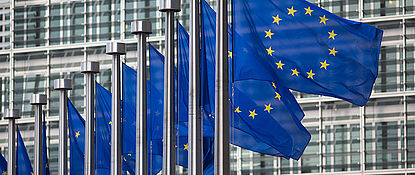Curriculum and modules
M1: The EU as a Legal Area (8 ECTS Credits)
The EU as a Legal Area module aims at equipping participants with basic knowledge of the central issues related to institutional and substantive European law. In lectures and participatory courses, participants study and analyze important aspects, such as the organisation and working methods of EU institutions, as well as the basics of economic law, including the "four basic freedoms". By introducing participants to this basic legal knowledge, participants develop an understanding of the legal determination of the economic, political and social structure of Europe.
M2: Politics and Governance in Europe (13 ECTS Credits)
Based on the fundamental historical, theoretical, institutional and procedural knowledge of the European multi-level system, the Politics and Governance in Europe module provides an insight into the key issues of the process of European integration: with a focus on security policy, constitutional politics as well as issues of common foreign policy. The module comprises courses on theories of political science, the European integration and political process, the development of a constitution for Europe, the common foreign and security policy as well as the historical development (path dependencies) and scenarios for the future. It aims at providing participants with relevant knowledge enabling them to critically and independently analyze European integration.
M3: Europe in the Age of Globalisation (12 ECTS Credits)
The Europe in the Age of Globalisation module gives an introduction to key economic policy issues in the context of the increasing economic integration of Europe and the world. Introductory courses provide participants with basic knowledge of an economic approach. Lecture series present an overview of special economic policy issues, such as agricultural, monetary and regional policies. Courses with a focus on law and history complement the economic discussion of globalization processes.
M4: Structure and Change of European Societies (10 ECTS Credits)
The Structure and Change of European Societies module comprises courses that provide participants with basic knowledge of the social structure of European societies. They aim at analyzing the causes, forms and consequences of social change from a comparative perspective. A special focus is on demographic and social processes, also in connection with issues of migration and mobility, as well as related issues of social differentiation and integration in increasingly globalized and transnational contexts. In addition, the module focuses on developments in the area of human rights, in particular in the context of the Council of Europe, the European Union and the Organization for Security and Co-operation in Europe. In this context, the module also places an emphasis on the situation of national, ethnic and religious minorities as well as on cultural identity/identities and multilingualism.
M5: Theory and Practice (4 ECTS Credits)
Participants acquire basic knowledge of the European Union's funding landscape. The module places particular emphasis on the career perspectives at the institutions of the European Union.

